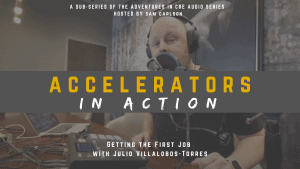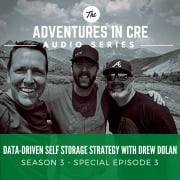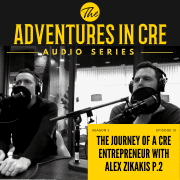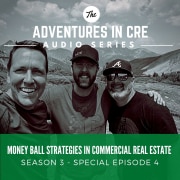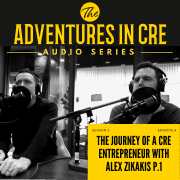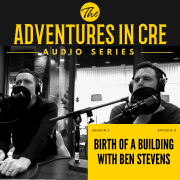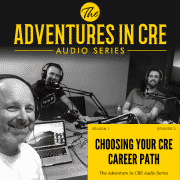Getting the First Job with Julio Villalobos-Torres – AiA
We get a lot of questions here at Adventures in CRE about how to “get the first job.” Many young professionals breaking into the market struggle to do just that. Jobs available often require experience and or connections – things that new professionals often lack.
This episode features Julio Villalobos-Torres, an underwriting analyst at Freddy Mac’s and Accelerator graduate. As a recent university graduate, Julio’s after-school job plans fell through after the events of 2020. In this episode, we speak on how to get that first job – without having any experience or real estate connections.
This is our 6th episode in a growing sub-series of interviews with commercial real estate professionals. This Accelerators in Action sub-series tells the stories of CRE professionals at all stages of their career, from students to senior-level professionals. Their experiences will provide you with insights into how to take your real estate career to the next level.
Listen to this Episode – Getting the First Job with Julio Villalobos-Torres
Resources from this Episode
- Adventures in CRE: https://www.adventuresincre.com/
- View our CRE Career Resources: https://www.adventuresincre.com/careers/
- A.CRE Accelerator: https://www.adventuresincre.com/accelerator/
Episode Transcript – Getting the First Job with Julio Villalobos-Torres
Sam Carlson (00:03):
Making your mark in commercial real estate is a journey best travel with grit, determination, and a mindset to take action. To most, success at the highest levels is a fleeting thought and an unrealistic expectation. But to others, opportunity boils down to focus, preparation and a lifelong commitment to learning and improvement. Join me as I take you into the lives of those unwilling to leave their success to chance, and instead take complete control of their futures. These are action taking, limit breaking, never faking accelerators in action.
Sam Carlson (00:37):
All right. Welcome back to the Accelerator in Action audio series, and it’s a sub-series of our main podcast. My name is Sam Carlson, I’m the host of this podcast. And one of my favorite things to do on this podcast is bring people in who have a story, whether they’re students, we’ve talked with students before, we’ve talked with people who are starting their career, and we’ve talked with people who are going to the next level and achieving awesome, cool, amazing things in their career.
Sam Carlson (01:11):
My goal is to share what they’ve done to take action. What they’ve done to achieve things, which, I mean, at some level, getting a job for the first time is an achievement in of itself. Everybody wants to know, well, how can I get a job without experience? Or whatever the question is. That getting the engines turned for the first time is a challenge. Our guest today is Julio Villalobos Torres. Julio, did I butcher your name a little bit, buddy, because I do speak Spanish, but I don’t know… Villalobos, how’s that?
Julio Villalobos (01:52):
That was perfect. Not going to lie. Just to not confuse the audience, I do tend to introduce myself as Julio.
Sam Carlson (02:01):
Do you really?
Julio Villalobos (02:03):
I do, I do.
Sam Carlson (02:04):
Okay. Well, Julio, I’ll try and say Julio going forward. But yeah, I speak Spanish so when I was reading your name, Julio Villalobos Torres. So that’s good, man. Well, like I said, Julio, thank you for being on the podcast today. We’re excited to have you. Let’s kick this thing off. I’m going to turn it over to you. I want to know about what you do today. Tell us a little bit about where you’re at in your career and then we’ll kind of go back and talk about how you got here and, have a cool conversation. What do you do today?
Julio Villalobos (02:40):
Sure, sure. So I am an underwriting analyst for Freddie Mac’s multi-family division targeted affordable housing team under the underwriting and credit department. And I am brand new, I’m about a month and a week in and I’m loving it so far. I think it’s a wonderful working culture. I’m learning so much already and I’m excited for what’s to come. I know there’s so much more I could learn.
Sam Carlson (03:11):
That’s awesome.
Julio Villalobos (03:11):
Knowing where I would end up today made all the previous months of anxiety, uncertainty, it made it all worth it.
Sam Carlson (03:22):
Yeah, it’s a weird time. It’s a weird time right now. 2020 kind of threw everybody for a loop and I’m guessing if you’re a new graduate coming into the job market, you probably had some concern.
Julio Villalobos (03:36):
Oh yeah, yeah. Ton of concern. But before the pandemic hit, some of my classmates were fortunate enough to have something lined up, but I was part of that group that didn’t have anything for certain. Really going into this pandemic, as is the case with millions of others, my plans just crashed and my dreams were put on a hiatus. Going forward, there were a couple other challenges I had to go through so I didn’t let the fact that my classmates had a job lined up, I didn’t let that discourage me because I knew that I had my own mission, my own goals, my own ambitions.
Julio Villalobos (04:24):
I was eyeballing to be in a position ideally outside of Texas. Now, going to Texas A&M and being in real estate, it would seem to a no-brainer for most people why I would want to leave Texas. I mean, there’s so many strong markets here. Well, for the most part, there was just personal preference. I mean, I grew up here and I would ideally like to be in another spot.
Julio Villalobos (04:59):
There were a couple of different markets I looked at. Looked at the Northeast, Pacific Northwest and the Northeast. Coming out of school I didn’t have any experience. I did grad and undergrad school rolled up into one. As I learned earlier this year, there’s somewhat of a perceived risk whenever you’re hiring, looking to hire somebody that’s out of state versus somebody that’s local, which is why it’s good for you to go to grad school in the market that you want to work in. But I wasn’t thinking about that at age 15, 16, whenever it was I was applying to school.
Sam Carlson (05:39):
Yeah. Were talking about where you went to school, Texas A&M, and their real estate program has basically a track where you do the entire… Is it the undergraduate and graduate and a four-year timeframe? Is that right?
Julio Villalobos (05:54):
Yes, yes, that’s right. So there are two real estate programs. One is the master’s in real estate development, the other is the master’s in real estate. I went to the development program, which is under the College of Architecture. The other program is in the business school. So we’re sort of like sister programs. We share a couple of classes.
Sam Carlson (06:13):
Okay. Tell us where you’re from because you said you lived in Texas your whole life and you wanted to maybe try another place. A little bit about your background. Where are you from? A little bit growing up there.
Julio Villalobos (06:33):
So I was born in Mexico City, but I grew up here in Texas in College Station, which is literally where Texas A&M is that. When I arrived here, I didn’t have the luxury of being born into a family that owned or operated a real estate company in any capacity. We didn’t know anybody in the real estate industry, not any friends, literally nobody. And not having that network to begin with, it was a challenge because somewhat I felt that I wanted to be in this industry, but I wasn’t sure. I didn’t have anybody that could give me guidance, nobody I could ask questions towards. On top of that I was also a first-generation college student so that was another learning curve I had to go through.
Sam Carlson (07:27):
Right. You knew you wanted to do real estate. Why did you think you wanted to do real estate? I mean, it sounds like, from what you were saying, that was something you knew you wanted to do from a young age.
Julio Villalobos (07:41):
So as a child, I was always fascinated with the built environment and it all started off more or less on the urban design at the street scape level. Whenever I was first exposed here in College Station, I tended to walk a lot, especially with my mom, whether it was to work or to shop or whatever. Walking through, I noticed these pretty narrow sidewalks, especially underneath the Texas sun. It was flaming. They’re pretty wide lanes so I felt somewhat uncomfortable and this is something I internalized as a child. As I grew up my interests started to expand.
Julio Villalobos (08:31):
By the time I got to college, I had basically solidified the fact that I wanted to be in this industry. I was just fascinated with the physical environment and also the transactions that happen behind the scenes that make this possible.
Sam Carlson (08:47):
Yeah. Did you feel like you’re more interested in the transactional side, so the investment side of stuff, or the art… Because when you’re a kid and you’re looking at the buildings, did you like the architectural side too? Or were you more interested and you knew that you just want to be involved in the big development scheme of things? Where were you at when you started?
Julio Villalobos (09:13):
Well, I would say where I was looking at, and more or less what I was exposed to throughout school, was definitely in the physical site planning aspect of it. I did recognize that there’s a whole other field out there. Capital markets, the financing part of it, that was definitely something I wanted to get into because where some people tend to not know where exactly they want to be in real estate, I was kind of on the other side of the spectrum. I was on the other extreme. There’s so much I wanted to do, but at the end, I realized that I don’t have the life expectancy or the working years in me to try out everything that I wanted to so I narrowed it down to what I absolutely know I was passionate about and what I really want to do for the rest of my career, which is mixed-income and affordable housing.
Sam Carlson (10:17):
It was very coincidental that where you grew up was right next to a really great real estate program that had everything kind of wrapped up into one. So did you know when you were in high school, whatever, were you like, “That’s where I got to go. That’s the program I want to be in.” Did you have that level of foresight then?
Julio Villalobos (10:37):
Yes, yes, for the most part. Really I didn’t really give much thought about other universities. I did apply just in case, but I also knew pretty early that Texas A&M offered this fast track program, this accelerated [crosstalk 00:00:10:54], as it’s called, for master’s and bachelor’s at the same time. This is what I wanted to commit to because not only would I save time, I would also save money and I would get exposed to that graduate school setting a lot earlier, which I knew I would definitely benefit from, which I did. Not knowing anybody, of course, being a first-generation student and all, meant that I would have to build out my network from scratch and everything I know up to this point I had to learn on my own.
Sam Carlson (11:29):
Yeah, and talk about that. What was that like coming, again, like you said, you’re a first-generation and there’s an inherent challenge where you come in and other people might have other opportunities because they’ve got extended family or just relationships there. So talk about how when you started in the school, how did you frame your success, I guess? Because again, you graduated in 2020, right? You graduated this year.
Julio Villalobos (12:12):
Yes, yes.
Sam Carlson (12:13):
And you got a job right out of college in one of the worst economies or one of the worst job markets. I’m guessing you had some kind of plan so talk to us about dealing with some of that adversity there.
Julio Villalobos (12:29):
So right off the bat, I got involved with my student real estate organization, which is the student club for the master’s program I did. And I got involved with the Urban Land Institute. Both of these were pretty critical. They were foundational for me becoming the person I am today, not just for building knowledge, but also for building network.
Julio Villalobos (12:52):
I’ll confess, the first couple of times attending these networking events, I was absolutely shy. I was in the corner, I was that student in the corner that wouldn’t talk to anybody else except other students. It took one of my professors to actually pick me up and drag me to a conversation for me to slowly start breaking out of my shell.
Sam Carlson (13:16):
Really?
Julio Villalobos (13:18):
Definitely. I’m glad he did that because it worked. Slowly but surely I began approaching people on my own. Same thing goes with the student real estate organization. I would attend as many events as I could and I would write every single thing down, even though it didn’t make any sense to me at the time, but I recognize the value in it. Going back, I actually looked back at my notes a couple of weeks ago and it all made sense at this point. Back then I had a feeling that eventually this is going to make sense, but I just had to stand by.
Sam Carlson (13:56):
Yeah, that’s interesting. You had a club, you came into the club, you got those friendships, those relationships, and you had one person who made a difference and really started the movement, the momentum of your initial success. Is that a fair statement?
Julio Villalobos (14:20):
Yes. I would say that’s a fair statement. But from that one person, it quickly became a whole host of people. I mean, I didn’t know anybody before and I would say my first network were my professors and students at the time.
Sam Carlson (14:39):
Yeah. So you graduated this year. How did you get a job? Because I mean, there’s a lot of people, especially people… We get emails, even graduates of the accelerator program or just other folks in the community, just it’s not the best market to be going and getting a job right now. How did that work out?
Julio Villalobos (15:06):
So I would say I was absolutely blessed to be where I am today. It wasn’t without a degree of suffering. So back in March, whenever this happened, early March, I had intended to finally start putting some effort into figuring out the next stage of my life. And then COVID hit and then a bunch of uncertainty. So I was looking for something out of state, which on top of me being somebody, being a candidate that’s out of state, I was also competing with folks that were not entry-level folks, they had some degree of experience. So I’m sure a lot of employers didn’t even think twice whenever they looked at me. But I didn’t let that discourage me. I knew pre-COVID even that it was going to take me a while.
Julio Villalobos (16:03):
I was also somewhat conservative as far as who I chose to approach and who I applied to because I knew the importance of that first job out of school. I know it’s very foundational and it’s likely going to define your whole career. I was looking for something out outside of Texas, looking for something within mixed-income or affordable housing. Also, on top of that, somewhere where I knew I would be happy both on and off the job and that’s relative to company culture, as well as whatever city I was looking at. It was definitely difficult.
Julio Villalobos (16:46):
So I actually had applied and I interviewed for a capital markets position with Freddie Mac at first and I advanced through the interviews until the final stage where it was a three-hour interview with about seven to eight different parties. To this day it remains the most intense and longest interview I’ve been through. Even though I didn’t get that position, I’m glad I went through it because I learned a lot about myself. This is one of those environments that really tests you to the limit.
Julio Villalobos (17:23):
So I didn’t get that position. That was around June, I want to say May, June. Then about a month later I interviewed for a production analyst for Freddie Mac as well. Similar case, I didn’t get that position, but it looks like I made an impression because those folks that interviewed me passed me on to the underwriting team, which is where I’m at today. So like they say, third one is the strike.
Sam Carlson (17:53):
So the third one is the charm. That actually worked for you that time. I mean, a lot of people will go through a lot of, whether that’s cold calling, cold outreach, things like that. They’ll go through a lot of people before they find any success. And you were able to do that on the third opportunity. So this was a job that was just posted to a job board, or how did you find the job?
Julio Villalobos (18:22):
Yes, yes. So the first two were posted and I didn’t know about the third one. That’s whenever they referred me to it and that’s how I found out. And then I was invited to apply and after interviewing, I heard back a couple weeks later with the good news. But like you said, I mean, early on in the process, a couple of months ago, I started cold calling and emailing and setting up all these informationals, whether it be just to learn more about a particular role or to actually build a relationship and maybe something will come out of that. The longer it went, the more it seemed like it was hopeless. But after a while, all these calls were worth it. I started learning a lot more and expanding my network while I’m at it.
Sam Carlson (19:18):
Okay. So you were talking about your first interview being pretty intense and that you learned some stuff. So I’m curious to know when you actually ended up getting hired, was there one thing that made a big difference or what were some of the things going into that last interview that really made you stand apart do you think?
Julio Villalobos (19:41):
So, I would say my involvement in my extracurricular probably made up where I fell short, which was an experience. That involves me not only participating in the real estate club, but also taking up leadership positions within it. I served as president, vice-president, marketing and industry relations. Besides that, I was also pretty involved with my local chapter of ULI, not just with my local chapter, but given the pandemic and a lot of events going virtual, I branched out to a whole myriad of different chapters. Aside from that, I would say my participation in different student competitions, ULI Heinz, American Planning Association, and American Society of Landscape Architects, I think that’s probably what made me stand out a little bit more.
Sam Carlson (20:42):
So I wasn’t keeping count but it seems like you rattled through about five or six different extracurriculars through that little spiel there. Was that big part of your plan going into it? Just saying, “Hey, I’m going to show that I’m committed and involved and an action taker and that a person, an employer, would want to see that.” Was that the basis of all that, do you think?
Julio Villalobos (21:12):
Yes, yes. And a lot of this came through thanks to some of the graduate students I had met in my first couple of semesters. So about the competition for ULI Heinz, I knew that pretty early on, but my first year I was an undergrad, I couldn’t participate. My second year, they hadn’t turned me into a graduate status, so I wasn’t eligible to participate either. It wasn’t until last year where I participated and this year as well. And for this year, our team was very fortunate enough to receive an honorable mention, which out of, I think it was like 115 teams, places us at the top 10% with four finalists and nine honorable mentions. This is only the second time Texas A&M has received an honorable mention.
Julio Villalobos (22:04):
Historically speaking, we’re not exactly prepared to take this on so there were a couple other hurdles I had to go through. One of that was we didn’t have the benefit of a CoStar subscription, which meant that I would have to double down the market assumptions and all the inputs for the proforma.
Julio Villalobos (22:25):
We also don’t have as expansive of a network that can serve as advisors for this competition. We don’t have that much history in this competition so we only ended up getting one advisor out of the four that we could get. I was the only real estate person in my team so I had to be very careful with how I estimated my modeling, my assumptions, my inputs, because with our sole advisor coming from a design background, I would essentially be making all the absolute decisions. So there’s absolutely no room for second-guessing.
Julio Villalobos (23:10):
But I would say most impressive about all of that, I would say is just the demographics of the competition. So the finalists and honorable mentions, and even some of the folks that don’t place but are still pretty competitive, they tend to be students that have a degree of work experience and then come back for their masters, as well as a dual master’s students. And me, I didn’t have any experience and just to be recognized on the same stage as some of these other powerhouse programs and people, I think it’s something… It’s truly an honor and I think it’s a testament to the work the team and I put in. It felt like the climax of my college career, like the previous three and a half years have been building up to this. It was such an amazing feeling.
Sam Carlson (24:06):
As far as the skills, and there’s a lot of things to learn in real estate, but it sounds like modeling is a strength, is something that you really enjoy. Is that accurate?
Julio Villalobos (24:19):
Yes, yes. And this competition happened before I took the accelerator, so I wasn’t as confident or as comfortable modeling as I am right now.
Sam Carlson (24:30):
I was going to say, wouldn’t it be nice to have another opportunity to go back and say, “Hey, I’ve gone through the best modeling program there is. Now let’s see what we got.” How cool would that have been?
Julio Villalobos (24:46):
That would have been cool. It would have been nice to have another shot, but I feel like I’m retired from school at this point.
Sam Carlson (24:55):
Yeah, no, I don’t blame you. So let’s talk about what’s the next steps? You got a great job. What’s your ambition? What’s the plan? What are you looking for as you… I know you’re a month and a half into your new job, so it’s not like you have a whole lot of… It’s hard to make a goal unless you really understand what you’re doing right now. But talk to me about this new job. What’s next in your career and a little bit about that?
Julio Villalobos (25:32):
So like the rest of my team at Freddy, we’re all remote. Next step, see where this COVID situation, see what happens with this. And that’s really indicative, depending on how many cases there are, the situation, when we’ll be returning to the office. But this position is in the national headquarters in Virginia so hopefully, sometime in the next couple of months, I’ll be moving up there.
Julio Villalobos (26:02):
Currently, I’m also active with the ULI chapter for Washington in the mentorship program. What I decided I wanted to do next is I want to start giving back more now that I finally have a job and that I know a little bit better, I want to have opportunity to give back. And I think I can do that being involved in these different affiliations, but also volunteering. As far as everything else, I guess we’ll just have to see, but I’m very excited for the future.
Sam Carlson (26:40):
Yeah, that’s awesome. Let’s wrap this up. Before we go, life and just making big steps and achieving things and going after your dreams, all that kind of stuff, you learn a lot and you learn through adversity and adversity creates awesome lessons, which in turn, maybe lead to some good advice. So advice that you might have for people who are trying to get… There’s a lot of people trying to get their first job right now. There’s a lot of people who are in school and maybe potentially even nervous about, hey, school’s ending and I’m going into a challenging work environment. What would be a piece of advice or something you’ve learned over your life and your career that you could share with our listeners?
Julio Villalobos (27:33):
Of course. So my first bit of advice would be to reach out to as many people as you can, and be prepared for questions or be prepared with questions. A lot of these people are busy and the fact that they’re even giving you the time of day means so much so don’t disrespect that. Come prepared, stay curious, ask a lot of questions and have as many oof these conversations [inaudible 00:27:59].
Julio Villalobos (28:02):
Next bit of advice would be to give back whenever you can. This could be giving back to the person you’re trying to connect to, or if somebody is reaching out to you, put out your best effort to give back. Paying it forward, you know?
Sam Carlson (28:17):
Yeah.
Julio Villalobos (28:19):
And also, it’s also about attempting to build genuine relationships. It’s a two-way street and you don’t want to be that one person reaching out and then sucking all the knowledge out of whoever you’re talking to and then at least not giving an effort to give back or to let them know that they can reach out for whatever.
Sam Carlson (28:44):
Yeah. Well, that’s solid advice. It’s a cliche phrase that real estate is a relationship business, but nothing could be more true. I mean, there’s no other industry that I know of where your network and your relationships can… It is as big a contributor to your success as anything else, right? So that is a solid piece of advice.
Sam Carlson (29:14):
So Julio, thanks so much for being here with us, really appreciate it. And to our listeners, thank you for participating and listening today. Hopefully, you’ve learned and had a good time listening to us chat as well and we’ll see you on the next episode.
Sam Carlson (29:30):
Thank you for tuning in to this episode of Accelerators in Action. For show notes and additional resources, head over to www.adventuresincre.com/audioseries.
Sam Carlson (29:42):
Would you like to learn real estate financial modeling in a matter of weeks and do it with zero guesswork? If so, the ACRE accelerator is for you. The accelerator is a step-by-step, case-based program designed to teach you exactly what you need to know and in the order you need to know it so you can gain both the knowledge and experience to take your career to the next level. To see if the accelerator is right for you, go to www.adventuresincre.com/accelerator.

